Son of DSO's Leonard Slatkin composed score for new Detroit bankruptcy documentary
- Oops!Something went wrong.Please try again later.
Making a compelling film out of Detroit’s infamous 2013 bankruptcy required a few essentials: Accounts from those in the thick of the action. Human interest, dramatic conflict. Surprise twists.
And a gripping musical score certainly doesn’t hurt.
“Gradually, Then Suddenly,” which will have its inaugural public screening Wednesday to open the Freep Film Festival, features a score composed and conducted by 27-year-old Daniel Slatkin and recorded with members of the Detroit Symphony Orchestra.
Alongside the familiar figures featured in the bankruptcy saga — Gov. Rick Snyder, Mayor Mike Duggan, emergency manager Kevyn Orr — the Slatkin name brings its own Detroit resonance: Daniel is the son of former DSO music director Leonard Slatkin, now the orchestra’s music director laureate.
Recording at Orchestra Hall during a two-day session in early December was poignant for the 27-year-old composer and classically trained pianist, now based in Los Angeles. During his dad’s DSO tenure, he played piano there as a 17-year-old and debuted his own concert piece in 2018.
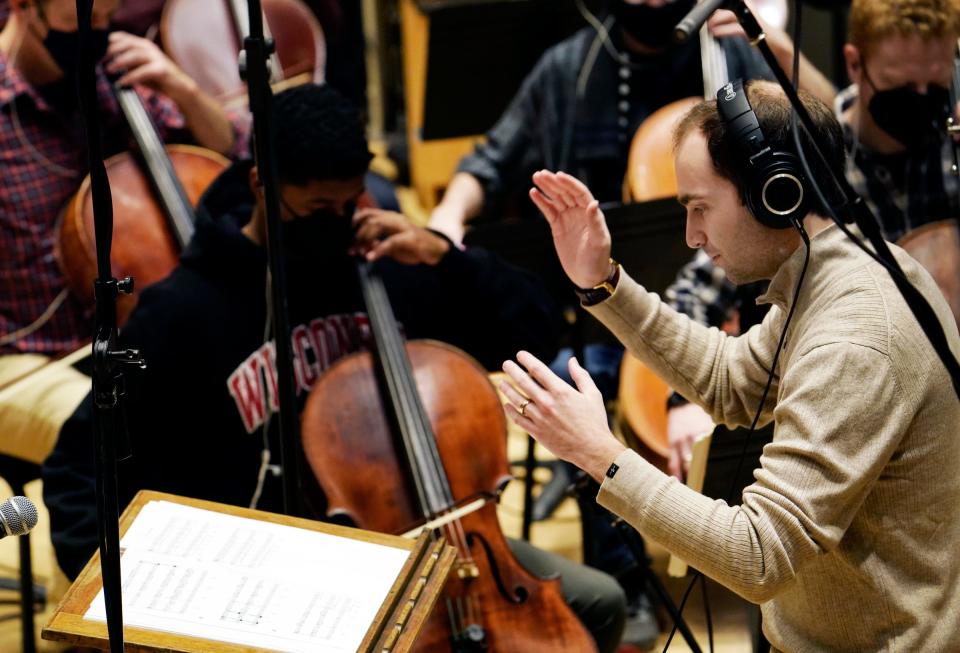
“So I had experienced a couple of major career milestones on that stage already. This was another one. I couldn’t have picked a better place to have this recording, and I felt incredibly comfortable up there,” he said. “It’s always a magical feeling for any composer to be able to see life being breathed into the music he or she has written, but to be able to do it in such a historic concert hall with such a great group of players was really special to me. It felt like a homecoming.”
When you watch “Gradually, Then Suddenly,” you’ll find yourself listening intently, too. Slatkin’s score is distinct and fitting, driving the documentary with detective-flick tension, plaintive heartache and shimmering hope as needed.
More: Freep Film Festival ticket holders get free extras on two film events
More: Magic Johnson documentary will close 2022 Freep Film Festival
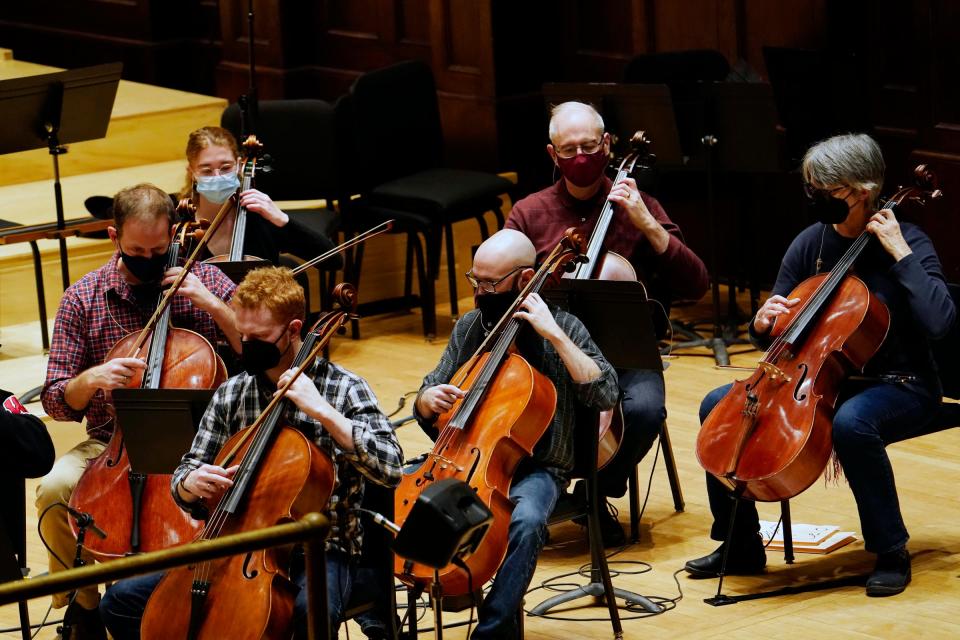
The composer deployed a 19-member string section of viola, cello and bass, but avoided violins and their higher frequencies because he wanted a “heavier, more industrial sound” suiting the Detroit setting. The DSO performances were supplemented by his own piano and electronic work — including clacking typewriters and snapping fingers — along with flugelhorn soloing by jazz player Jeff Beal.
At Orchestra Hall, musicians donned headphones and played to a prerecorded electronic score. A Los Angeles recording team had flown in for the sessions, with an engineer back in California supervising via Zoom.
“Recording for a film might not necessarily be something the DSO players do every day, but they caught on immediately,” Slatkin said. “And it was an incredibly smooth process.”
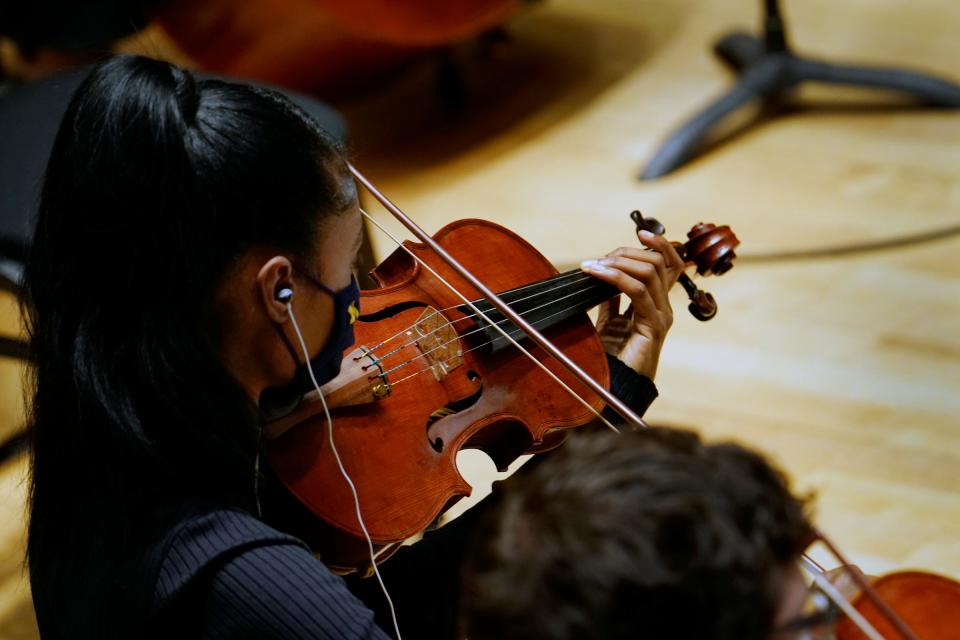
Enlisting a big-league symphony orchestra is rare for an independent documentary, and the doc’s producers credit late DSO president Anne Parsons with pulling the levers to make it happen. Also helping the cause was a $200,000 injection last year from the Library of Congress Lavine/Ken Burns Prize for Film, which their in-production project won.
“She was really a champion for this, and I’m really grateful for that effort,” Slatkin said of Parsons, who died in March. “I hope that we made her proud.”
The DSO’s involvement in the bankruptcy film marks a sort of cultural kinship: The Detroit Institute of Arts, after all, became an unwitting central figure in the drama, its art collection at stake as officials scrambled to cover city pension shortfalls.
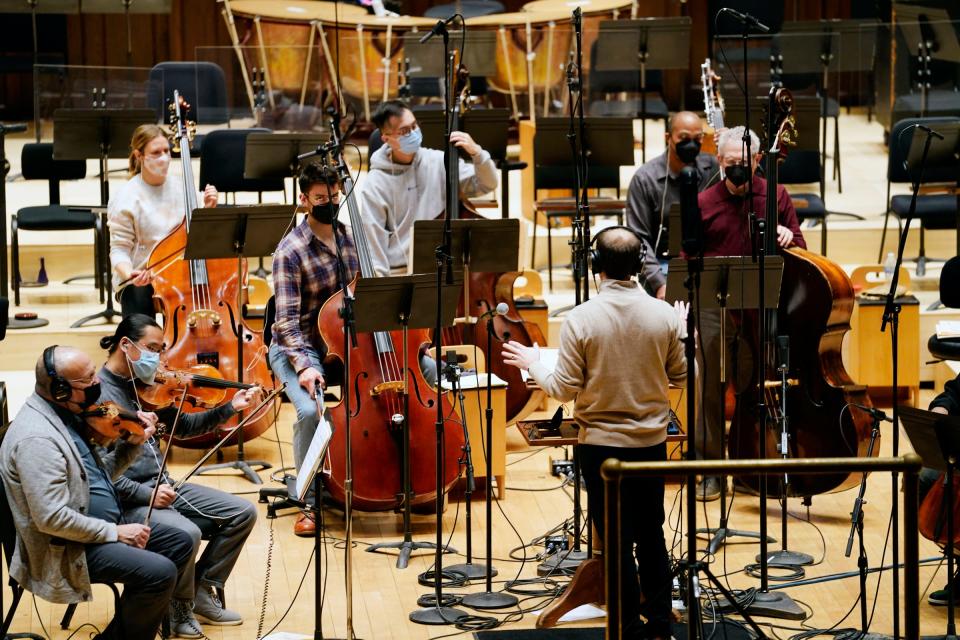
Sam Katz and James McGovern, the film’s co-producers and co-directors, say they were determined from the outset to have strong music — and they lucked into Slatkin early on. In 2018, the young composer was in Detroit to premiere a concert piece at the DSO’s Heroes Gala. There he met the wife of Gerald Rosen, the federal judge who had overseen the bankruptcy, and mentioned that he was a budding film composer.
The judge soon called Katz to give him the tip.
“As soon as I heard the name Slatkin, I was already sold,” Katz said.
“It’s pretty uncommon for a composer to come aboard as early as Daniel did, and we were lucky he wanted to do it,” McGovern said. “The story was of great interest to him, and we really developed a relationship with him. He’s brilliant at taking esoteric ideas and turning them into something real.”
Slatkin said the film’s team sought something distinct.
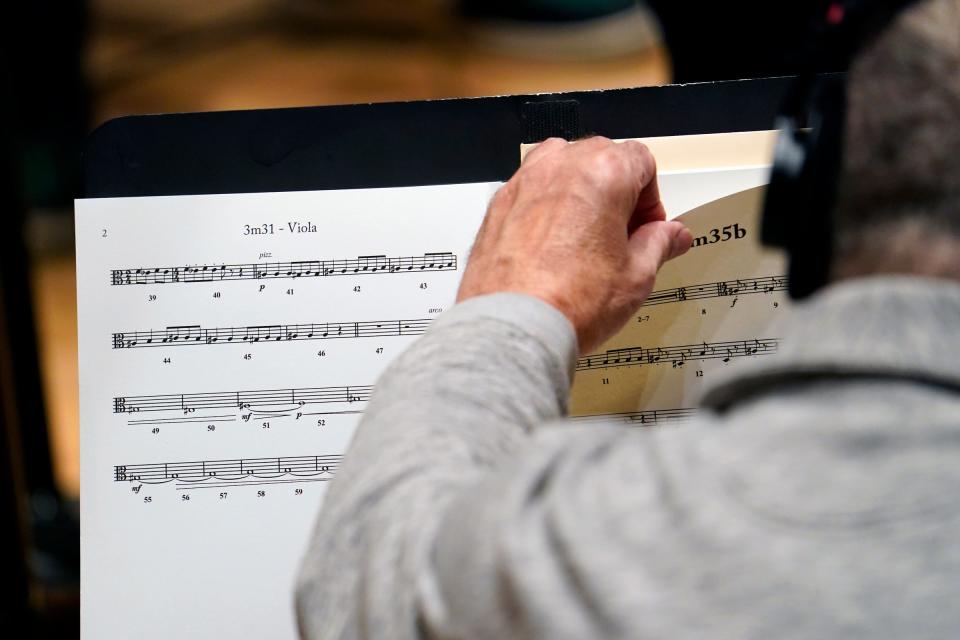
“It’s a film about Detroit, but they didn’t want to lean too heavily into Motown,” he said. “They wanted the score to have a unique voice and characteristic. Coming from an orchestral background, I thought the Detroit Symphony might provide that voice we were looking for. That’s where my head went.”
A touch of Motown-style sound does make a cameo at one point, as the film recounts the civil rights era in Detroit. For the DSO, it was another full-circle moment, harking back to the orchestra’s days playing on myriad Motown hits.
All in all, Katz and McGovern were thrilled with the results: At the end of December’s recording session, Katz jokingly apologized to Slatkin, telling him: “The music is so beautiful, it’s a shame to hide it behind a movie.”
The producers say Slatkin’s music is a backdrop for about 85% of “Gradually, Then Suddenly,” well above the typical 60% for a documentary. They’re so satisfied with the work, they’re releasing the music as a stand-alone soundtrack, including a possible vinyl-record edition.
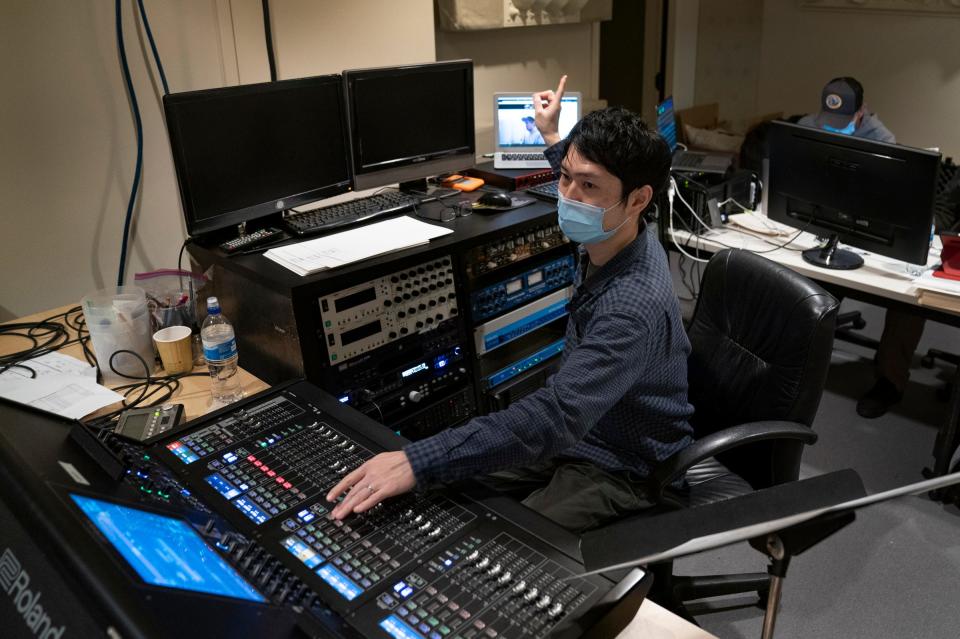
Just six years after his first stab at film composing during his final term at the University of Southern California, Slatkin, 27, said the bankruptcy doc is a key “jumping-off moment” as he aims for a career focued on scoring big-studio films, TV shows and even video games.
“An opportunity like this doesn’t always come around for someone my age, and I’m fortunate I got to seize it,” he said.
His musical toolbox is eclectic enough for the world of 21st-century media: Atop his lifelong immersion in classical music, he spent his teens learning the art of DJing and rock bass, eager to stop feeling “married to the page when playing.” He credits that improvisational approach with fueling his composing abilities later on.
And his family lineage bodes well for the film pursuit. In addition to his famous conductor father, Slatkin’s grandparents were smack at the intersection of music and movies. In an era when big studios had their own in-house orchestras, his grandfather Felix Slatkin was the concertmaster at 20th Century Fox. (“In any classic Fox movie, if there’s a violin solo, it’s likely my grandfather,” he said.)
His grandmother Eleanor Slatkin was the principal cellist with Warner Bros., while his granduncle was a pianist with the studio.
He didn't know them well. His grandfather died especially young.
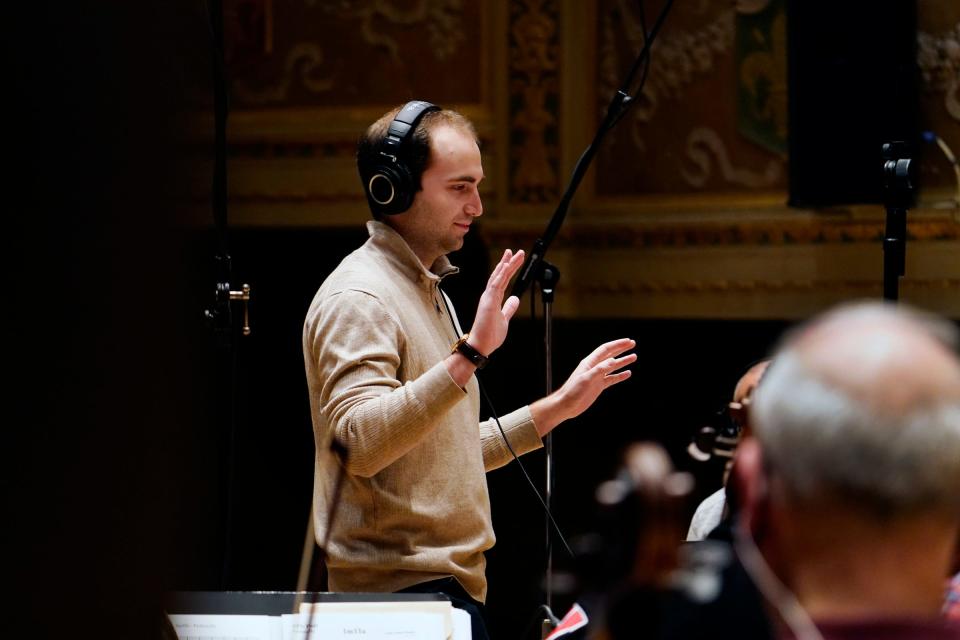
“In a way, I get to connect with them through film music professionally, and that’s really special to me,” Slatkin said.
The composer-musician is making his own Hollywood name: At last month’s Idyllwild International Festival of Cinema, his score for the indie feature “Neon Bleed” was awarded best score and was selected for the win by Queen’s Roger Taylor.
Composing for film, he said, is an intoxicating combo of creative energy, deadline pressure and thinking on the fly.
“That’s one thing I love about it — you never get stuck in a routine,” Slatkin said. “Every scene has its own challenge. It’s like a puzzle you’re trying to solve. And I love the feeling I get when I’ve solved it.”
Contact Detroit Free Press music writer Brian McCollum: 313-223-4450 or bmccollum@freepress.com.
'Gradually, Then Suddenly: The Bankruptcy of Detroit'
Freep Film Festival
7 p.m. Wed.
Detroit Film Theatre at the DIA
5200 Woodward, Detroit
Michigan Science Center
5020 John R, Detroit
Admission to Wednesday night's screening "Gradually, Then Suddenly" is free, though only a limited number of tickets remain. Free passes remain for at-home virtual viewing. For details, go to FreepFilmFestival.com.
This article originally appeared on Detroit Free Press: DSO's Daniel Slatkin composed score for Detroit bankruptcy documentary

